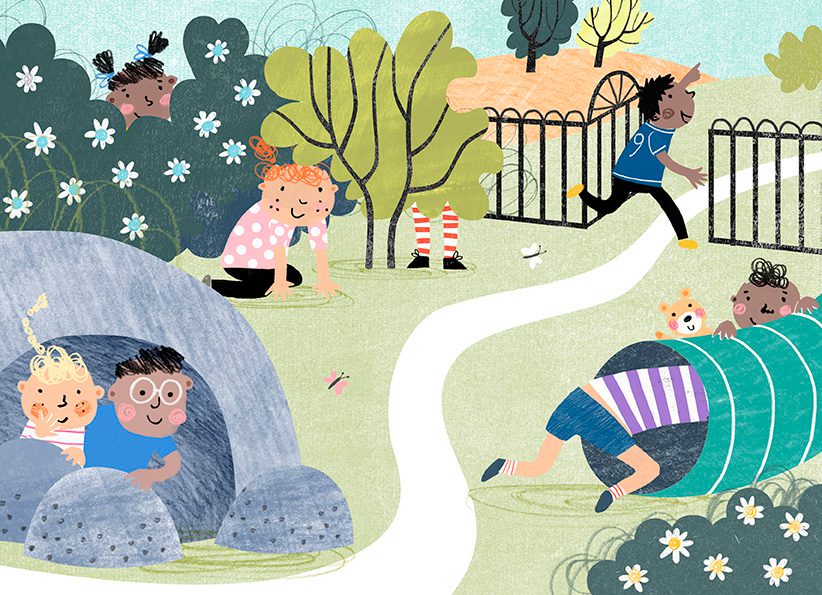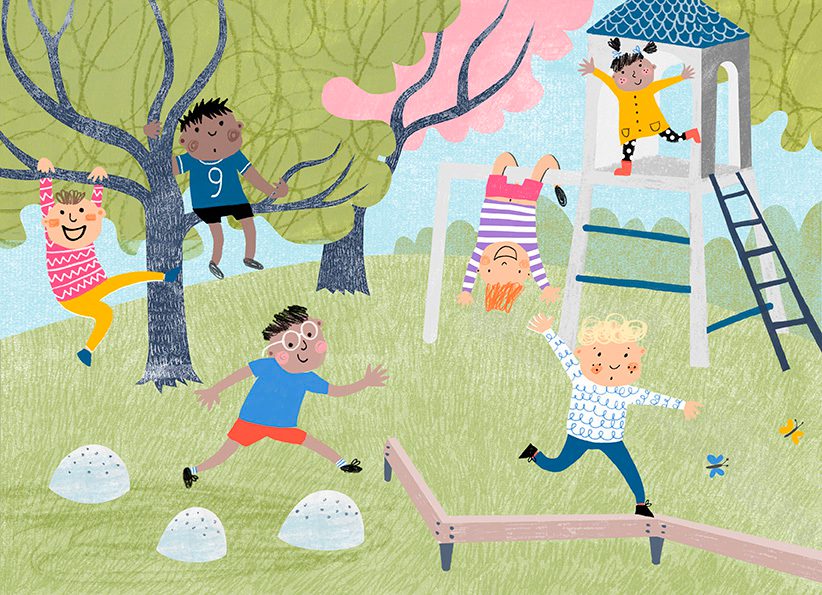This research project's aims were to "develop and validate a new pictorial self-report measure of adventurous play for use with 3- to 7-year-olds".
Dr Lily FitzGibbon worked with 3 to 7-year-old children and a children’s illustrator to co-create a pictorial self-report measure that captured the activities, thoughts and feelings associated with adventurous play. This measure allows children to communicate how they feel about adventurous play with researchers and educators.
The project recognises children as autonomous learners and provides a way to evidence the learning opportunities that outdoor and adventurous play can offer.
Download the final report (PDF) 'Illustrating Adventurous Play' by Dr Lily FitzGibbon (May 2024)
This new measure will form the critical lynchpin for further research advancing understanding of the role of adventurous play for children’s health, wellbeing and learning.
Illustrated Adventurous Play Toolkit
The team developed an 'Illustrated Adventurous Play Toolkit' to provide prompts and provocations to help young children (pre- and primary school age) to talk about their experiences and perceptions of adventurous and risky play.
The illustrations, available in colour, greyscale, and line drawing are available to download for free.

About the research team
The project was led by Dr Lily FitzGibbon, a lecturer in psychology at the University of Stirling with expertise in children’s play and mental health. Lily has experience leading and conducting research with preschool and primary age children. Through her research, she seeks to understand responses to uncertainty, including children’s adventurous play and curiosity, and their impact on learning and wellbeing.
The project was run in collaboration with award-winning children’s illustrator Kasia Matyjaszek, who ran workshops and design illustrations for the project. She is experienced running storytelling workshops with young children.
An expert advisory panel provided guidance as the project progressed. The panel included Professor Helen Dodd, University of Exeter; Matt Robinson, Learning Through Landscapes; Dr Gregory Mannion, University of Stirling.

About the project
True adventurous play elicits thoughts and feelings of risk, thrill, excitement, challenge, fear, and uncertainty, none of which are captured by third-person measures. This project aimed to create the first self-report measure of adventurous play providing opportunities for researchers to quantify the activities, thoughts, and feelings experienced during adventurous play.
The project has Froebelian principles at the heart of both the research topic and the research design... Froebel himself recognised the importance of adventurous play, for example, writing that opportunities to take risks by climbing trees will allow a child to “discover a new world” and “broaden his thoughts and feelings” (Froebel, 1967, p. 126), offering opportunities for learning that can protect from future dangers and anxieties associated with the unknown."
Dr Lily FitzGibbon
The project had three phases:
- Participatory research - interviews and co-creation workshops conducted with children from one kindergarten and one primary school. The illustrator engaged on the project ran a drawing workshop with classes of children. Additionally, small groups of children completed a playground tour - to . encourage children to describe, demonstrate and draw the activities, thoughts and feelings that they associate with adventurous play.
- Illustration - an illustrator created simple illustrations to capture the activities, thoughts and feelings that are experienced during adventurous play. Brief narrative descriptions using the children’s vocabulary and phrasing from the participatory phase accompanies each illustration.
- Validation - the illustrations were shown to children from the kindergarten and primary school, as well as expert members of the advisory panel, to ensure that the intended activities, thoughts, and feelings are endorsed.
"... a key outcome of the project is the development of an openly available tool that helps to promote knowledgeable, nurturing educators who understand the perspective of children in their care. By developing a tool to help children to communicate their feelings about play, educators will be better able to understand, scaffold and nurture individual children’s play needs."
Dr Lily FitzGibbon
Publications and presentations
The team shared a poster of their work including drawings from children on adventurous play, at the International Play Association Conference in June 2023.
Final Report (PDF) 'Illustrating Adventurous Play' by Dr Lily FitzGibbon, May 2024

